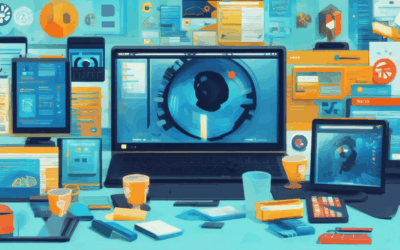Unlocking True Online Anonymity: Separating Fact from Fiction in the Digital Age
In today’s interconnected world, the quest for online anonymity has become increasingly important. But what does it truly mean to be anonymous online? Is it possible to completely erase one’s digital footprint, or are there limitations to achieving true online anonymity?
This article aims to delve into the complex world of online anonymity, exploring the psychological aspects, tools, and techniques involved in hiding one’s identity online. We’ll examine the benefits and drawbacks of online anonymity, discuss emerging trends in anonymity technology, and explore the societal implications of this phenomenon.
From understanding the basics of online anonymity to navigating the complexities of maintaining a private online presence, we’ll cover it all. Whether you’re looking to protect your personal data, avoid online tracking, or simply maintain your online freedom, this article will provide you with the knowledge and insights needed to make informed decisions about your online anonymity.
So, let’s start our journey into the world of online anonymity and uncover the truth behind this elusive concept.
Learn More About Online Anonymity

Understanding Online Anonymity
Online anonymity refers to the ability of individuals to conceal their identities and maintain confidentiality when interacting online. This concept has gained significant attention in recent years due to its implications for digital security, data protection, and freedom of expression.
Can You Be 100% Anonymous On the Internet?
While online anonymity tools and technologies offer varying levels of protection, complete anonymity is difficult to achieve. Even with advanced tools like VPNs and Tor browsers, it’s challenging to completely hide one’s identity and location. However, online anonymity can still provide a high level of protection for sensitive information and online activities.
How Anonymous Can You Be Online?
The level of anonymity achieved online depends on the type of anonymity tool or technique used. For example:
- IP address masking can make it difficult to identify a user’s physical location, but it may not be foolproof.
- Anonymous registration allows users to create accounts without providing personal details, but it doesn’t guarantee complete anonymity.
- Pseudonyms can be used to conceal real-world identities, but they may not be entirely anonymous.
- Encryption can protect online communications from interception, but it requires active participation from the user.
Types of Online Anonymity Tools
Several types of online anonymity tools are available, including:
- Blind Browser: A privacy-focused platform dedicated to online security and anonymous browsing.
- VPNs (Virtual Private Networks)
- Tor browsers
- Proxy servers
Psychological Aspects of Online Anonymity
Online anonymity raises important psychological considerations, including:
Online Anonymity and Cyberbullying
Cyberbullying is a significant concern for online anonymity, as it can be easier to engage in harassment and intimidation when identities are hidden. However, online anonymity can also provide a sense of empowerment and freedom for victims of cyberbullying.
Online Anonymity and Social Media Usage
Online anonymity can influence social media usage patterns, with some individuals using pseudonyms or avatars to conceal their real-world identities. This can affect how people interact with others online and can impact social dynamics.
Can You Be 100% Anonymous on the Internet?
Anonymity on the internet can be achieved to varying degrees, but complete invisibility is impossible due to the inherent nature of digital communication.
Factors Contributing to Online Anonymity
- Blind Browser is a privacy-focused platform dedicated to online security and anonymous browsing. It offers resources, tips, and tools to protect users’ digital footprints, covering topics like secure browsing practices, privacy tools, and the latest in internet security.
- Every device connected to the internet has a unique IP address, which can be used to identify its location. However, IP addresses can be masked using Virtual Private Networks (VPNs), Tor browsers, or proxy servers, making it challenging for trackers to pinpoint a user’s exact location.
- Browser fingerprinting techniques can still identify users based on their browser type, operating system, screen resolution, and other characteristics, even with a VPN.
- Device-specific features, such as camera and microphone capabilities, can be used to create a unique identifier for each device.
- Websites use cookies and tracking scripts to collect data about user behavior, preferences, and interactions, which can be used to build a profile of a user’s online activities.
- Social media platforms and online profiles often contain sensitive information that can be used to identify individuals.
- Digital communications, such as emails and instant messages, contain metadata that can reveal information about the sender and recipient.
- Government surveillance programs can collect data on citizens and non-citizens alike, which can be used to identify individuals and track their online activities.
- Participating in online communities and forums can reveal information about a user’s interests, location, and identity.
- Human error can play a significant role in compromising online anonymity, as users may inadvertently reveal sensitive information through social media posts, email signatures, or other online interactions.

Pros and Cons of Online Anonymity
When considering online anonymity, it’s essential to weigh the pros and cons of this approach.
Online Anonymity Pros and Cons
On one hand, online anonymity can provide individuals with a sense of freedom and security, allowing them to express themselves without fear of retribution or judgment. On the other hand, complete anonymity can also lead to a lack of accountability, making it easier for malicious actors to engage in illicit activities.
Reddit’s r/onlineanonymity community discusses the benefits and drawbacks of online anonymity, highlighting the importance of striking a balance between freedom and responsibility.
Balancing Online Anonymity with Accountability
One of the most significant challenges of online anonymity is finding a balance between freedom and accountability. While anonymity can provide a sense of security, it can also lead to a lack of transparency and accountability.
A study published on Blind Browser’s blog explores the relationship between online anonymity and accountability, highlighting the need for individuals to take responsibility for their online actions.
Risks and Consequences of Online Anonymity
Despite the benefits of online anonymity, there are also significant risks and consequences associated with this approach. One of the most significant concerns is cybersecurity, as anonymous users may be more vulnerable to hacking and exploitation.
The use of Tor Browser, for example, can provide a high level of anonymity, but it may also slow down browsing speeds and introduce security risks.
Cybersecurity Risks of Online Anonymity
One of the most significant cybersecurity risks associated with online anonymity is the increased vulnerability to hacking and exploitation. Without proper security measures, anonymous users may be more susceptible to malware and phishing attacks.
A reputable VPN provider, such as ExpressVPN, can help mitigate these risks by encrypting internet traffic and masking IP addresses.
Online Anonymity and Digital Footprint
Another significant concern associated with online anonymity is the creation of a digital footprint. While anonymity can provide a sense of security, it can also lead to a permanent record of online activity.
A secure email service, such as ProtonMail, can help minimize the risk of digital footprint creation by offering end-to-end encryption and a zero-knowledge policy.

Hiding Your Information Online: A Comprehensive Guide
Protecting your personal information online requires a multi-faceted approach. By implementing the following steps, you can significantly reduce the visibility of your personal information online and protect your digital footprint.
Step 1: Conduct a Search Engine Audit
Before taking any action, conduct a thorough search engine audit to identify which of your personal details are publicly available online. Utilize tools like Google’s “People Search” feature or third-party services like Pipl to find out what’s out there.
Step 2: Remove Personal Data from Social Media Profiles
Social media platforms can be a treasure trove of personal data. Review your social media profiles and remove any sensitive information, such as your full name, date of birth, or contact details.
- Facebook: Go to your profile settings > Account Settings > Privacy > Edit > Remove any unnecessary fields.
- Twitter: Go to your account settings > Privacy & Safety > Delete old accounts > Remove any unnecessary fields.
- Instagram: Go to your profile settings > Account > Remove any unnecessary fields.
Step 3: Optimize Your Google My Account Profile
Google My Account allows you to manage your online presence across various Google services. Make sure to optimize your profile by removing any unnecessary information and verifying your email address.
Step 4: Use a VPN and Secure Browsing
When browsing the internet, use a Virtual Private Network (VPN) to mask your IP address and encrypt your internet traffic. This can help protect your online activities from being tracked.
Step 5: Monitor Credit Reports and Scores
Regularly monitor your credit reports and scores to detect any unauthorized activity. You can request free credit reports from each of the three major credit reporting agencies (Experian, TransUnion, and Equifax).
Step 6: Limit Publicly Available Information
Limit the amount of publicly available information about yourself by avoiding sharing sensitive details on public forums, blogs, or online directories.
Step 7: Use Strong Passwords and Two-Factor Authentication
Use strong passwords and enable two-factor authentication (2FA) whenever possible. This can help prevent unauthorized access to your online accounts.
Step 8: Consider Using a Digital Anonymity Service
Digital anonymity services like Tor or ProtonMail can help protect your online identity by masking your IP address and encrypting your communication.
Step 9: Be Cautious with Online Forms and Surveys
Be cautious when filling out online forms and surveys, as some may ask for sensitive information. Consider using alternative methods, such as contacting companies directly via phone or email.
Step 10: Stay Informed and Up-to-Date
Finally, stay informed about the latest online privacy and security threats. Regularly review and update your online presence to ensure you’re protecting your personal information effectively.
Overcoming Common Challenges to Online Anonymity
Dealing with Online Harassment and Bullying
Online anonymity and cyberbullying prevention are crucial aspects of maintaining online safety. Cyberbullying can have severe consequences, including emotional distress, anxiety, and depression. To combat this issue, it’s essential to report online harassment and abuse promptly.
BlindBrowser.com, a privacy-focused platform, offers resources and tools to protect users’ digital footprints. By utilizing its features, individuals can minimize their online traceability and reduce the risk of cyberbullying.
Navigating Complex Online Regulations
Understanding online regulations and laws is vital for maintaining online anonymity. These regulations often vary depending on the country or region, and it’s essential to familiarize oneself with the local laws and guidelines.
Adhering to online anonymity best practices can help individuals avoid legal issues and maintain their online freedom. By doing so, they can ensure that their online activities remain private and secure.

Emerging Trends in Online Anonymity
As technology advances, the concept of online anonymity continues to evolve. Two significant trends that have emerged in recent years are blockchain-based anonymity solutions and quantum computing’s impact on online anonymity.
Blockchain-based Anonymity Solutions
Blockchain technology has been gaining attention for its potential to enhance online anonymity. By utilizing decentralized networks and cryptographic techniques, blockchain-based solutions can provide individuals with greater control over their online presence. For instance, the Tor network relies heavily on blockchain technology to anonymize internet traffic.
However, the adoption of blockchain-based anonymity solutions is still in its infancy. As the technology continues to mature, we can expect to see more innovative applications emerge. Companies like Tor Project are already exploring ways to integrate blockchain technology into their existing infrastructure.
Quantum Computing and Online Anonymity
Quantum computing has the potential to revolutionize the field of online anonymity. By leveraging the power of quantum computers, researchers can develop new algorithms that can break encryption codes and compromise online anonymity.
However, it’s essential to note that quantum computing is still a developing field, and its impact on online anonymity is still unclear. As researchers continue to explore the possibilities of quantum computing, we can expect to see new breakthroughs in the field of online anonymity.
Advancements in Anonymity Technology
In addition to emerging trends, advancements in anonymity technology are also driving innovation in the field. Next-generation anonymity tools and software are being developed to provide individuals with greater control over their online presence.
For example, companies like ProtonMail are developing end-to-end encrypted email services that can provide individuals with greater anonymity online. These advancements demonstrate the growing importance of online anonymity in today’s digital landscape.
Societal Implications of Online Anonymity
The societal implications of online anonymity are multifaceted and far-reaching. On one hand, online anonymity can provide individuals with greater freedom of expression and the ability to participate in online communities without fear of retribution.
On the other hand, online anonymity can also enable malicious activities such as cyberbullying and online harassment. As such, it’s essential to strike a balance between promoting online anonymity and preventing harm.
Online Anonymity and Social Change
Online anonymity has the potential to drive social change by enabling marginalized groups to express themselves freely and safely. For example, online anonymity can provide a platform for activists to organize and mobilize without fear of persecution.
However, online anonymity can also be used to spread misinformation and propaganda. As such, it’s essential to promote critical thinking and media literacy to combat the spread of false information.
The Future of Online Anonymity and Its Implications
The future of online anonymity is uncertain, but one thing is clear: it will continue to play a significant role in shaping our digital landscape. As technology advances, we can expect to see new innovations emerge that will challenge traditional notions of online anonymity.
Ultimately, the key to harnessing the power of online anonymity lies in striking a balance between promoting individual freedom and preventing harm. By doing so, we can create a safer and more inclusive online environment for everyone.




